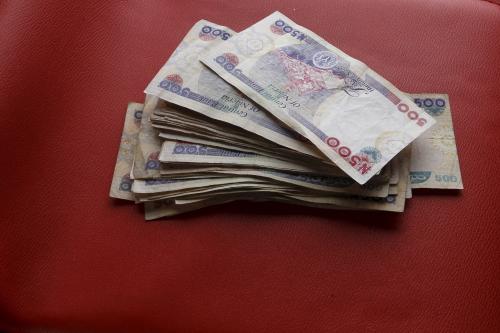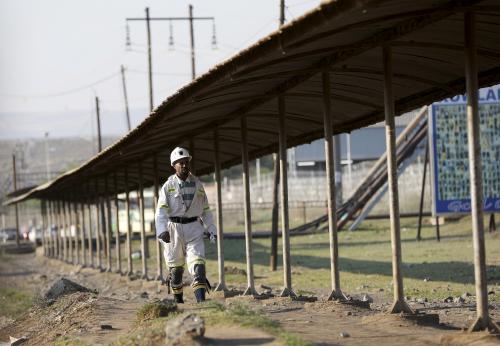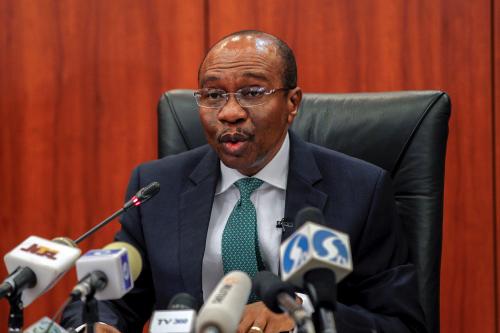South Africa’s current account deficit widens as Moody’s downgrade looms
On Tuesday, South Africa published current account statistics for the last quarter of 2015. The numbers show a widened current account deficit, attributed to an increase in imports and a slowed demand for South African exports. The deficit increased from 4.3 percent of GDP in the third quarter of 2015 to 5.1 percent in the fourth quarter. While a weaker rand could make South African exports more competitive, other factors such as the—drop in commodity prices, a challenging global macroeconomic climate, and an uncompetitive manufacturing sector—may negate the potential gains of a weak currency. The decreased inflow of federal direct investment—attributed to a drop in confidence in President Jacob Zuma’s administration—also contributed to the widened deficit. This widened deficit puts further pressure the rand, which continues to weaken against the U.S. dollar.
This week, Moody’s Investors Service announced that it will be reviewing South Africa’s credit rating amid the “continuing rise in risks to the country’s medium-term economic prospects and to its fiscal strength.” Next week, Moody’s will decide whether to cut South Africa’s current credit rating of BAA2, down one, to just above non-investment grade level. The downgrade would align Moody’s South Africa credit rating with that of the two other credit rating agencies, Standard and Poor’s and Fitch, whose current credit ratings for South Africa lie at BBB-. In anticipation of Moody’s decision—expected sometime next week—Finance Minister Pravin Gordhan continues to reassure investors about the future of South Africa’s economy and its fiscal framework.
South African President Zuma visits Nigerian President Buhari to discuss cooperation on trade and investment, security, and energy, among others
This week, President Zuma visited fellow African economic powerhouse, Nigeria , where he met with political and business leaders. In recent months, Nigeria and South Africa have faced increasing macroeconomic challenges—mainly attributed to the slump in commodity prices—which have put a strain on their respective economies. This visit brings the two African giants together in the aim to improve their economic climates through increased collaboration, notably improving their trade and investment ties.
The two countries have often had a tense bilateral relationship. For instance, in recent years, while some Nigerian travelers have felt particularly aggravated by the strict South African visa rules for Nigerians, while some South African companies have felt “targeted” while conducting business in Nigeria. This tension was notably seen in the recent $3.9 billion fine imposed by the Nigerian government on the South African mobile company MTN for failing to disconnect unused SIM cards. This week, the firms offered to pay $1.5 billion to settle the fine, out of court. Nigerians authorities have yet to respond to the offer.
After his return to Pretoria, Zuma issued a statement claiming that during his visit, the two countries formalized the South Africa-Nigeria Binational Commission (headed by Nigerian President Muhammadu Buhari and himself), whose role is to improve bilateral relations and increase cooperation in several sectors, including trade and investment, defense and security, immigration, and energy and mineral resources, among others. The two countries have also increased cooperation on the security front. Nigeria has agreed to the deployment of South African Special Forces to aid in the fight against Boko Haram. South Africa will also share some of its military expertise with Nigeria, including the transfer of skills, technology, information sharing, and research and development.
International Women’s Day prompts reflection on African women’s empowerment
On the occasion of International Women’s Day, celebrated on March 8, several organizations released new reports highlighting the status of women’s socio-economic empowerment in Africa. The International Labor Organization, for instance, published Women at Work: Trends 2016, which detailed how—despite significant improvements in educational opportunities for women in many regions—women worldwide still face greater barriers to accessing quality jobs and are more likely to be unemployed than men. According to the report, in sub-Saharan Africa, “over 60 percent of all working women remain in agriculture, often concentrated in time- and labor-intensive activities, which are unpaid or poorly remunerated.”
Another report launched by the ONE Campaign focused on how poverty is sexist, by elaborating on the linkages between poverty and gender inequality. It finds that 16 of the top 20 toughest countries in which to be born a girl—based on seven indicators of health, well-being, and political, economic, and educational opportunities—are in Africa, with Niger, Somalia, and Mali topping the list. The report also reveals that many women in Africa lack access to quality health care despite the unique challenges women face in terms of maternal health and nutrition, as well as the fact that “HIV/AIDS disproportionally affects women and girls,” especially in Africa where “three-quarters of adolescents contracting HIV are girls.”
Both of the publications highlight unpaid care or other work as major causes of inequality and call for redistribution of and adequate compensation for such work, among other suggestions of advancing legal equality (repealing laws that discriminate against women) and prioritizing women’s rights within African Union’s Agenda 2063 and the 2030 Agenda for Sustainable Goals.
For more policy recommendations on rectifying gender imbalances in Africa, please see Eyerusalem Siba’s recent Africa in Focus post: The case for gender-sensitive policies in sub-Saharan Africa.





Commentary
Africa in the news: South Africa faces potential credit downgrade, South Africa and Nigeria strengthen relationship, and world celebrates International Women’s Day
March 11, 2016